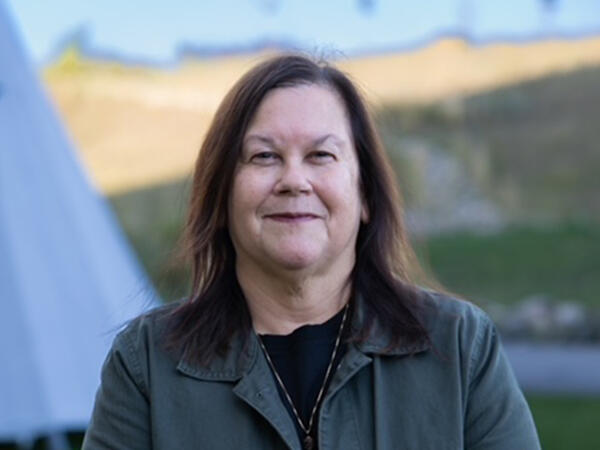Lee Dupuis co-directs interprofessional network that promotes use of clinical practice guidelines for supportive care
As a clinical pharmacist who cares for children with cancer, Lee Dupuis brings a unique perspective to her role as co-director of the International Pediatric Oncology Guidelines in supportive care (iPOG) Network, an interprofessional group focused on improving supportive care and quality of life for children with cancer.
“Because I care for patients, I’m very aware of how families and patients interact with drugs, what treatments make sense to them and what they may struggle with,” she says. “I have that knowledge to rely on when I’m helping prepare or develop clinical practice guidelines, and certainly during their implementation.”
Since children have very high survival rates for cancer, managing treatment side effects such as nausea and vomiting and helping children maintain a high quality of life are important treatment goals. Supportive care focuses on these goals.
Dupuis, a clinician scientist at the U of T’s Leslie Dan Faculty of Pharmacy and senior associate scientist at The Hospital for Sick Children, leads a supportive care research program that uses symptom screening tools and patient-reported experiences to evaluate ways to identify the supportive care needs and manage treatment-related symptoms in children receiving cancer treatments. She is a well-respected expert in the field, publishing numerous articles with international teams, as well as participating in the development of clinical practice guidelines related to supportive care for children with cancer.
Clinical practice guidelines are recommendations for health care professionals to provide the best patient care based on the available evidence. Clinical practice guidelines are highly specific; in supportive care alone, clinical practice guidelines cover topics as varied as chronic pain management, fertility preservation and preventing chemotherapy-induced nausea and vomiting. They are based on systematic literature reviews to ensure that all recommendations are evidence-based.
“It’s so important for organizations to coordinate and collaborate to increase the quality of our guidance and to avoid duplicating work. We can accomplish more together and have a greater impact on patients.”
Several years ago, Dupuis noticed that, even though the pediatric oncology community is small, there was a need to share best practices regarding clinical practice guideline development, dissemination and implementation.
“Having worked on a few clinical practice guidelines, I know they are an enormous amount of work,” Dupuis says. “It’s so important for organizations to coordinate and collaborate to increase the quality of our guidance and to avoid duplicating work. We can accomplish more together and have a greater impact on patients.”
In 2015, Dupuis reached out to colleagues around the world to assemble an informal group of experts that kept each other informed on efforts to develop clinical practice guidelines. In 2021, the iPOG Network formalized its membership – with Dupuis and Dutch pediatric oncologist Wim Tissing as co-directors – and focused on making its work more accessible to the pediatric oncology community.
“The overarching aim is to optimize the supportive care and quality of life of kids undergoing cancer treatment,” Dupuis says. “And the iPOG Network members really feel that implementation of clinical practice guideline recommendations are key to doing that.”
Interprofessional collaboration is key to iPOG Network’s efforts
The Network does not develop guidance itself, but rather serves as a resource and communication platform by communicating best practices and methods for guideline development and helping to prevent duplication of effort. They also host a searchable library of current supportive care guidance on their website and support other knowledge translation activities, such as webinars, to help health care professionals implement evidence-based guidance.
The iPOG Network’s members represent nine pediatric oncology organizations from around the world and include pediatric oncologists, nurses and experts in methodology and guideline development, with Dupuis being the only pharmacist.
“Supportive care of kids with cancer is an interdisciplinary, interprofessional effort. It’s really important to have as many of the players as possible involved in the development of these clinical practice guidelines,” she says.
Tissing agrees that the variety of perspectives is vital to the network’s mission.
“These types of networks are important because they combine all kinds of people with different expertise, but also different social and cultural input, to eventually get the best possible result,” he says. “Lee has a focus and vision and is able to get people together. She is a good leader and has expertise in supportive care, making her a natural chair for the group.”
“These international efforts can make a big difference in improving care for children and ensuring they and their families maintain a high quality of life through a challenging experience.”
Dupuis says that pharmacists have key skills that can help them excel in leadership and advancing care for patients.
“Clinical practice guidelines are founded on systematic literature reviews and are evidence-based, and as pharmacists our training is very focused on that,” she says. “We also bring the expertise on drugs, the potential for drug interactions or toxicity, and the logistical aspects of drug administration and preparation, which are all important to consider.”
With her clinical appointment at SickKids and roles with pediatric oncology groups, Dupuis is able to help implement newly developed clinical practice guidelines to provide optimal care for children and families.
“These international efforts can make a big difference in improving care for children and ensuring they and their families maintain a high quality of life through a challenging experience,” she says.
More News
Image

Pharmacy alum sees change in acceptance of Indigenous cultures in health care
During Deborah Emery’s 40-year pharmacy career, she provided care in Sioux Lookout, Thunder Bay and Manitoulin Island.
Read More
Image

Grad to Watch: Jackie Fule Liu’s research focuses on better outcomes for diabetes patients
A recent PhD graduate, Jackie Fule Liu combines hands-on skill and big-picture thinking to help tackle diabetes care challenges.
Read More
Image

U of T community members recognized with Order of Canada
Congratulations to Dean Emeritus and Professor K. Wayne Hindmarsh on his appointment.
Read More
